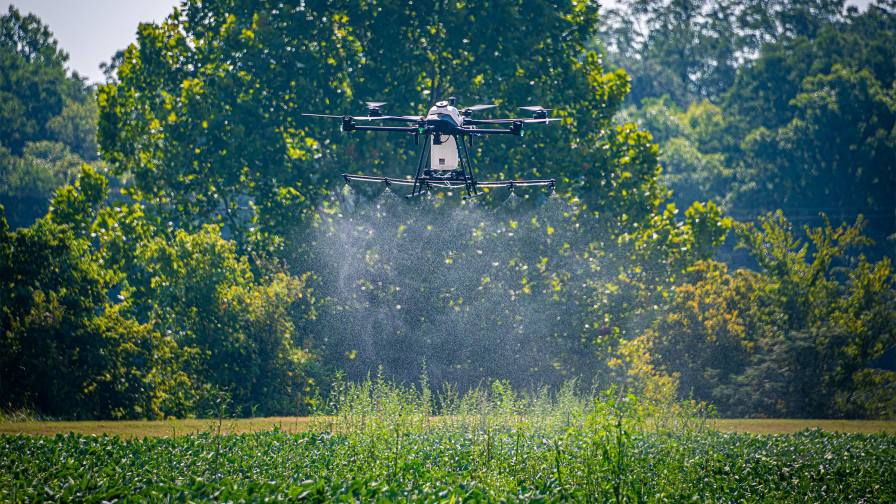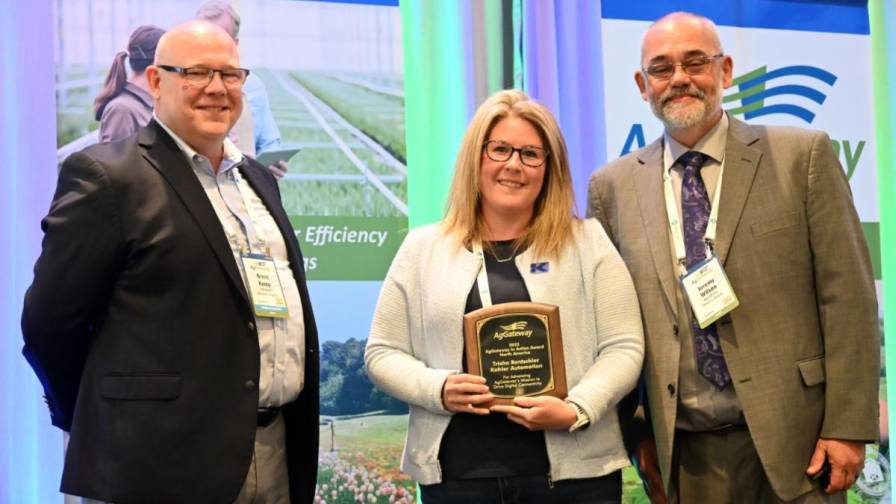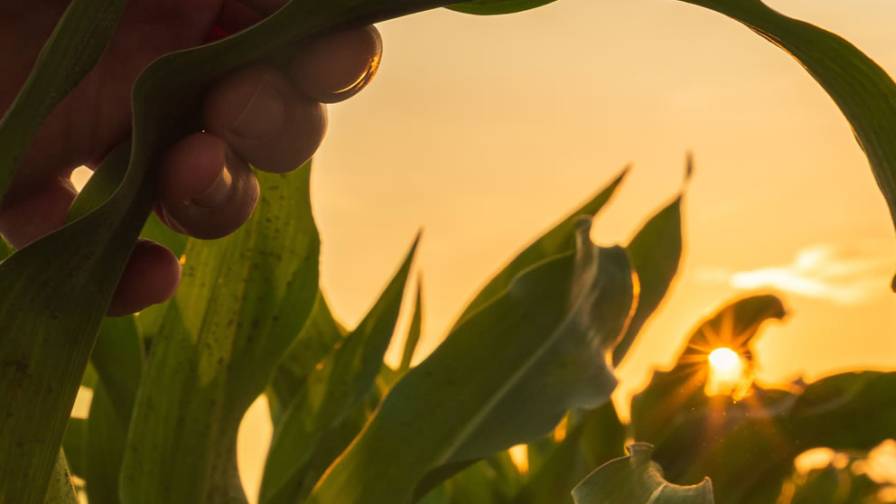Lack of awareness and action observed in response to Sustainable Groundwater Management Act
A landmark law – representing one of the most revolutionary changes to groundwater management in California history – was passed more than 10 years ago. But many farmers across the state still have not even heard of the Sustainable Groundwater Management Act, or SGMA.
Jarin Tasnim Anika started as a SGMA technical assistance community educator for small farms with University of California Agriculture and Natural Resources earlier this year. She said that of the dozens of small-scale farmers she has spoken with, “an extremely small fraction” of them had heard of SGMA.
“I’ve been driving around Merced, Stanislaus and San Joaquin counties – the counties I cover – and for almost all of the small farmers, I can honestly say that I was the first person who has talked about SGMA with them,” Anika said.
After SGMA was passed in 2014, over 260 Groundwater Sustainability Agencies (GSAs) were formed and charged with creating locally focused plans for California’s patchwork of basins and subbasins to achieve sustainability by 2040. Those Groundwater Sustainability Plans are submitted to the California Department of Water Resources for review and to ensure compliance with the law.
GSAs are making progress toward this goal. They’re developing strategies to prevent overdraft of groundwater and are addressing a host of related problems for farmers, residents and the environment – from wells running dry to poor water quality to land subsidence.
But while GSAs are required by law to consider all “beneficial users” in the implementation of SGMA, many of them overlooked a major subset of groundwater users: small farmers. Nearly 80% of farms in California can be categorized as small-scale farms, by the U.S. Department of Agriculture’s definition of small farm (a farm with annual gross cash farm income between $1,000 and $350,000).
In 2022, UC ANR and a coalition of partners published a report, “SGMA and Underrepresented Farmers,” that analyzed, through the lens of small farmers and socially disadvantaged farmers, the Groundwater Sustainability Plans developed by the agencies.
“We reviewed these 20-year plans to see if small-scale farmers are incorporated into that planning, and the results were alarming,” said Ngodoo Atume, one of the authors of the report. “We found that across all 14 plans we reviewed, none of those agencies were considering small-scale farmers.”
The result is that many small farmers (predominantly tenant farmers) with whom Atume has met are wholly unfamiliar with SGMA.
“We asked many questions: ‘Have you heard of SGMA? Have you heard of this groundwater regulation? Have you heard of the potential cutbacks? Has the landowner shown you any notice to attend a meeting?’” Atume said. “And we get ‘no’ across the board.”
Because the impacts and benefits of SGMA for small farmers are not addressed in those plans, the 2022 report recommended more focused engagement of those stakeholders. So this year, UC ANR hired a dedicated team to provide technical assistance, education, policy analysis and outreach for small farmers.
Atume serves as the statewide coordinator, and Anika is one of five regionally based SGMA educators for small farms, part of the UC Sustainable Agriculture Research and Education Program.
The others are Erik Rodriguez (Fresno and Madera counties), Luis Paniagua (Tulare and Kings counties) and Sonia Rios (Riverside and San Bernardino counties). Another educator is currently being recruited for Santa Clara, San Benito and Monterey counties.
‘Business as usual’: Cooperative Extension specialist finds farmers’ actions largely unchanged
A lack of awareness may be one reason California growers aren’t taking more action in the wake of the historic law’s passing. Despite the potential for future water regulation and reductions, one analysis indicates that SGMA is not yet affecting farmers’ decision-making.
Economists studied farmland parcels along the borders of neighboring GSAs, some with greater baseline overdraft (and ostensibly subject to more stringent SGMA restrictions) than others. Parcels near the administrative borders experience similar hydrological, climactic and agronomic conditions – the only difference being the expectation of greater future regulation.
The researchers then compared the differences in the planting of new perennial crops and the drilling of new wells between neighboring parcels of farmland, at a time before SGMA passed in 2014 and after SGMA, in 2020 and 2021.
“We found that SGMA had no statistically significant effect on the differences,” said Ellen Bruno, associate professor of Cooperative Extension in the Department of Agricultural and Resource Economics at UC Berkeley.
In other words, farmers didn’t seem to be altering their practices in the face of impending regulation. Bruno and co-author Nick Hagerty concluded it appears that, in SGMA’s early years, potential restrictions were perceived to be so far in the future that short-term considerations – like well-drilling in response to drought or planting due to favorable markets – were taking precedence.
“The implication of people continuing business as usual so far is that the groundwater will continue to be overdrafted,” Bruno added. “And, of course, the point of SGMA is to try to correct that and bring the basins into sustainability.”
She said that Atume’s community education team can help small farmers learn more about groundwater management and take appropriate action.
“There’s a lot of variation in what people know; big farmers have many more resources to plug into changing regulations,” Bruno said. “I think Ngodoo’s team could be really instrumental in helping everybody stay informed – both on how they’re going to be regulated and what they can do to respond to the regulation.”
SGMA education team sees uneven implementation across agencies
Management actions outlined in the Groundwater Sustainability Plans include groundwater allocations, taxes or fees based on users’ extraction, pumping restrictions, and efficiency incentives, among other policy instruments (see a database summarizing strategies in those plans).
And while the agencies have laid out their long-term plans and actions, implementation has been uneven and inconsistent.
“It’s a very small percentage of GSAs that are actually implementing actions right now that might impact the stakeholders,” Atume explained. “In that sense, SGMA is still at the very beginning stages, and so people are not worried about it.”
Nevertheless, the team wants to begin a step-by-step education process. Piggybacking on personal networks and events established by their UC ANR peers, the regional educators are finding opportunities to introduce themselves and build trust with local farmers. They are planning workshops for later this year.
Eventually, they want farmers to see them as people to contact if they have questions about groundwater.
“If you have any questions related to a random fee that you’re getting, or somebody came out and told you that you have to install this specific thing on your irrigation infrastructure, you can call me,” said Rodriguez, the educator for Fresno and Madera counties. “I’ll help you figure it out and explain it.”
Some farmers are already reaching out, such as a small farmer in Merced County who recently experienced quite a shock. According to Anika, the local GSA sent an invoice to the farmer with a penalty of $15,000 for overextraction of groundwater. She was referred to Anika, who explained that the notice was sent to make the farmer aware of her potential penalty.
Communication barriers a major challenge for small farmers
Beyond the task of distilling the complex, technical wording of SGMA into an easy-to-understand format, language barriers are another challenge.
For example, the majority of small farmers Anika has met with are Hmong, and she expressed gratitude for the linguistic help of staff research associate Vong Moua. Other members of the UC ANR Small Farms Network who speak non-English languages have helped with outreach to speakers of Spanish, Iu Mien, Punjabi and Cantonese.
A complicating factor is that GSAs will usually send flyers and mailings only to the owners of land – not the tenant farmers.
“Reaching tenant farmers is difficult because it requires very targeted outreach in their language to engage them,” Atume said. “Even for GSAs that have made a lot of progress with outreach, most times those materials still stop at the landowner, and then the responsibility then lies with the landowner to communicate that information to the small farmers.”
On their end, the community educators are also struggling with a dearth of information for crops grown by their clientele. According to Anika, Hmong farmers, for example, cultivate herbs, spices and seasonal vegetables under mixed cropping systems that have not been studied extensively by California academics, in terms of crop water use.
While growers of almonds have a lot of research-backed information about their crops’ water requirements, small-scale farmers often lack those resources.
“As a scientific team, we always try to give data-based recommendations, but at this point, I can only provide theory in our discussions – not data – so that’s another challenge I face all the time,” Anika explained. “I think people are trying their best to gather more information, but there’s just not a lot of research on these crops that are very culturally focused.”
SGMA educators cultivate partnerships with GSAs
Another key task for the SGMA education team is engaging with the Groundwater Sustainability Agencies themselves. The team members regularly attend agency meetings to share feedback and farmer perspectives.
“For some of these GSAs, there is – for the first time – someone consistently attending the meetings and providing small-farmer input on agenda items,” Atume explained. “That’s a huge part of the team’s work.”
Rodriguez, in Fresno and Madera counties, said he is first familiarizing himself with the GSAs (and their respective Groundwater Sustainability Plans) before reaching out to small farmers to explain the nuances of SGMA. He wants to know the details of those plans and the exact scope of his role – and then prepare the most relevant and accessible resources for when he approaches the growers.
“We’re finally at a point now where we’re starting to consult with different GSAs on how their work is conveyed in the outreach materials,” Rodriguez said. “We’re trying to make these materials GSA- or subbasin-specific, and we want their seal of approval and logo on it.”
Building and strengthening relationships with the GSAs is a high priority for the SGMA team members, as they get a better sense of the unique political pressures, legal situations or local interests that each agency must navigate. Anika noted that some GSAs have been eager to learn more about the needs of small farmers, and Rodriguez has found that agencies in his area are receptive to hearing from the community.
“They are open – they do answer questions, they do schedule meetings,” he said.
As the team assists GSAs in communicating with under-engaged stakeholders, Atume believes small farmers can be incorporated more meaningfully in the implementation of SGMA. She hopes all groundwater users contribute to a future where water is available for communities, agriculture and ecological health.
“Personally, I think everyone should comply with SGMA; I don’t think some stakeholders should comply and others shouldn’t,” she said. “But at the same time, I do think that there should not be disproportionate impact on any particular group of stakeholders. Overall, we all need to move towards sustainability.”
The SGMA education team is supported by funds from the state Legislature through the California Department of Water Resources’ Underrepresented Communities, California Tribes and Small Farmers Groundwater Technical Assistance Program.








